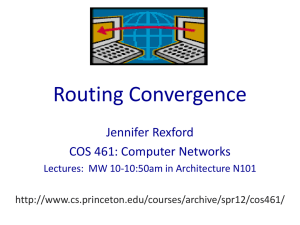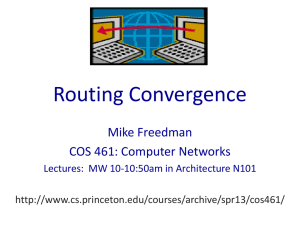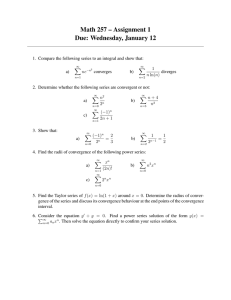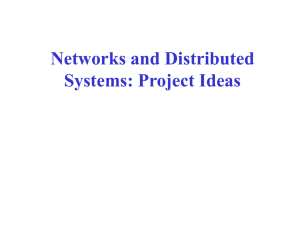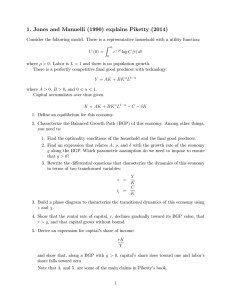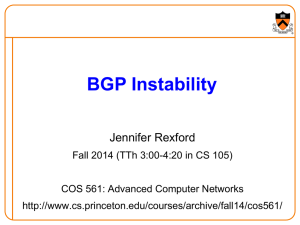Routing Convergence
advertisement
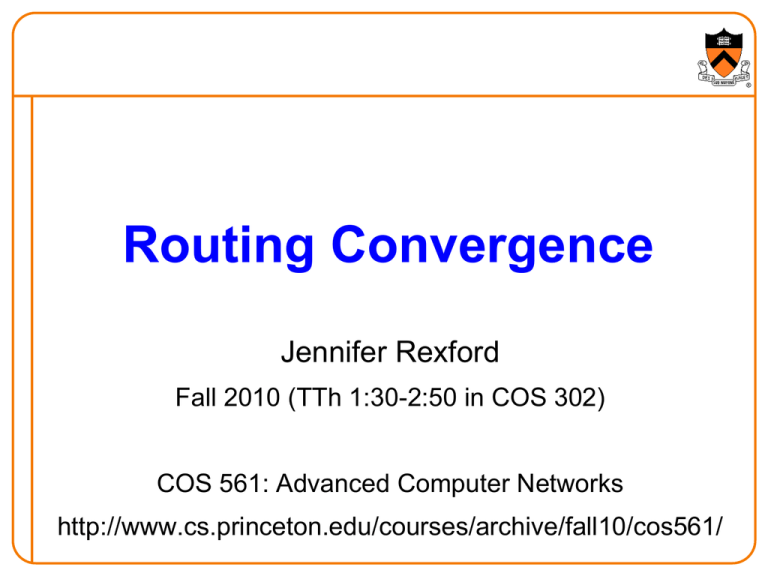
Routing Convergence
Jennifer Rexford
Fall 2010 (TTh 1:30-2:50 in COS 302)
COS 561: Advanced Computer Networks
http://www.cs.princeton.edu/courses/archive/fall10/cos561/
Intradomain Routing
2
Convergence
• Getting consistent routing information to all nodes
– E.g., all nodes having the same link-state database
• Consistent forwarding after convergence
– All nodes have the same link-state database
– All nodes forward packets on shortest paths
– The next router on the path forwards to the next hop
2
3
2
1
1
1
4
4
5
3
3
Transient Disruptions
• Detection delay
–A node does not detect a failed link immediately
–… and forwards data packets into a “blackhole”
• Depends on timeout for detecting lost hellos
–Or link media that can detect “loss of light”
2
3
2
1
1
1
4
4
5
3
4
Transient Disruptions
• Inconsistent link-state database
–Some routers know about failure before others
–The shortest paths are no longer consistent
–Can cause transient forwarding loops
2
3
2
2
1
1
1
4
3
1
4
2
5
3
1
4
1
4
3
5
Convergence Delay
• Sources of convergence delay
–Detection latency
–Flooding of link-state information
–Shortest-path computation
–Creating the forwarding table
• Performance during convergence period
–Lost packets due to blackholes and TTL expiry
–Looping packets consuming resources
–Out-of-order packets reaching the destination
• Very bad for VoIP, online gaming, and video 6
Reducing Convergence Delay
• Faster detection
– Smaller hello timers
– Link-layer technologies that can detect failures
• Faster flooding
– Flooding immediately
– Sending link-state packets with high-priority
• Faster computation
– Faster processors on the routers
– Incremental Dijkstra’s algorithm
• Faster forwarding-table update
– Data structures supporting incremental updates
7
Reducing Convergence Delay
• Weight tuning for planned maintenance
– Gradually increase link weight
– Before taking down the link
• MPLS fast-reroute
– Backup paths to use when the primary path fails
– Local protection to circumvent a failed link
2
3
2
1
1
1
4
4
5
3
8
Interdomain Routing
9
Causes of BGP Routing Changes
• Topology changes
– Equipment going up or down
– Deployment of new routers or sessions
• BGP session failures
– Due to equipment failures, maintenance, etc.
– Or, due to congestion on the physical path
• Changes in routing policy
– Changes in preferences in the routes
– Changes in whether the route is exported
• Persistent protocol oscillation
– Conflicts between policies in different ASes
10
BGP Session Failure
• BGP runs over TCP
– BGP only sends updates
when changes occur
– TCP doesn’t detect lost
connectivity on its own
AS1
• Detecting a failure
– Keep-alive: 60 seconds
– Hold timer: 180 seconds
• Reacting to a failure
– Discard all routes learned
from the neighbor
– Send new updates for any
routes that change
AS2
11
Routing Change: Before and After
0
0
(2,0)
(2,0)
(1,0)
(1,2,0)
1
2
1
2
(3,2,0)
(3,1,0)
3
3
12
Routing Change: Path Exploration
• AS 1
– Delete the route (1,0)
– Switch to next route (1,2,0)
– Send route (1,2,0) to AS 3
0
(2,0)
• AS 3
– Sees (1,2,0) replace (1,0)
– Compares to route (2,0)
– Switches to using AS 2
(1,2,0)
1
2
(3,2,0)
3
13
Routing Change: Path Exploration
• Initial situation
– Destination 0 is alive
– All ASes use direct path
• When destination dies
– All ASes lose direct path
– All switch to longer paths
– Eventually withdrawn
(1,0)
(1,2,0)
(1,3,0)
(2,0)
(2,1,0)
(2,3,0)
(2,1,3,0)
1
2
0
• E.g., AS 2
– (2,0) (2,1,0)
– (2,1,0) (2,3,0)
– (2,3,0) (2,1,3,0)
– (2,1,3,0) null
3
(3,0)
(3,1,0)
14
(3,2,0)
BGP Converges Slowly
• Path vector avoids count-to-infinity
– But, ASes still must explore many alternate paths
– … to find the highest-ranked path that is still available
• Fortunately, in practice
– Most popular destinations have very stable BGP routes
– And most instability lies in a few unpopular destinations
• Still, lower BGP convergence delay is a goal
– Can be tens of seconds to a few minutes
– High for important interactive applications
– … or even conventional application, like Web browsing
15
Beyond Faster Convergence
16
Research Ideas
• Modeling of routing convergence
– Bounds for BGP as function of topology and policy
– Impact on timer configurations on convergence
• Much smaller timers for faster convergence
– Understand trade-off between convergence time and
protocol overhead
• Distributed coordination of routing changes
– Avoid loops and blackholes during convergence
• Failure carrying packets
– Faster detection by piggybacking on data packets
17
Research Ideas
• Temporary backup routes in BGP
– Have an alternate path through another AS
• Multipath routing to survive failures
– Multiple paths, possibly computed in advance
– Load balancing over the currently-working paths
• Error-correction codes on multiple paths
– Spreading redundant traffic over multiple paths
– Reconstructing the traffic at the receiver
18
BGP Instability
19
Stable Paths Problem (SPP) Instance
• Node
– BGP-speaking router
– Node 0 is destination
2 21 0
20
4
– BGP adjacency
– Set of routes to 0 at
1
each node
– Ranking of the paths
5210
2
• Edge
• Permitted paths
5
0
1
3
130
10
most preferred
…
least preferred
420
430
30
A Solution to a Stable Paths Problem
2
210
20
• Solution
– Path assignment per node
– Can be the “null” path
4
– {u,w} is an edge in the graph
– Node w is assigned path wP
1
– The highest ranked path
consistent with assignment
of its neighbors
5210
2
• If node u has path uwP
• Each node is assigned
5
0
1
130
10
3
420
430
30
A solution need not represent
a shortest path tree, or
a spanning tree.
An SPP May Have Multiple Solutions
120
10
120
10
1
120
10
1
0
0
2
210
20
1
0
2
210
20
First solution
2
210
20
Second solution
An SPP May Have No Solution
2
210
20
4
0
130
10
1
320
30
3
3
Avoiding BGP Instability
• Detecting conflicting policies
– Computationally expensive
– Requires too much cooperation
• Detecting oscillations
– Observing the repetitive BGP routing messages
• Restricted routing policies and topologies
– Policies based on business relationships
Prefer paths through customers
Don’t provide transit service to peers and providers
– No cycles of provider-customer relationship
• Getting rid of BGP
24

